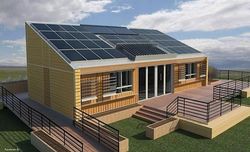One criticism of home solar systems is that they only make sense for rich people and hardcore environmentalists.
Maybe there should be a bumper sticker that says: “You don’t have to be a rich person or a treehugger to want solar panels… but it helps!”
When some people find out that solar panels can have a high upfront cost, they quickly become disillusioned. In the solar industry this is known as ‘solar sticker shock’ and it is very understandable.
After all, it would be a little shocking if you were thinking that you could throw some solar panels on the roof of your cottage for a few hundred bucks and then you were handed a solar quote in the five figure range.
You probably wouldn’t take in much information after hearing that sticker price because your mind would still be doing cartwheels, trying to figure out if you actually heard that number correctly.
When you finally accept that you heard the correct price, the thought might just occur to you:
“You don’t have to be a treehugger or a rich person to get solar panels… you have to be both!”.
And that, my friends, is where bumper stickers are born.
The shame about this situation, however, is that people might just be getting the wrong idea and giving up on home solar systems before they get all the pertinent information.
Some of the factors that could make the cost of solar power a lot less painful include:
- Lowering your upfront cost with a solar power rebate and…
- Setting up low monthly payments with solar financing

So maybe it isn’t only rich people who can take advantage of home solar systems.
In fact, if you can get a mortgage you might just be able to get attractive financing rates on a solar panel installation and begin saving money today. This largely depends on the available financing options and the cost of electricity where you live.
As far as needing to be an environmentalist to want home solar power, let’s just paraphrase our imaginary bumper sticker:
“You don’t have to be one… but it helps”.
In many areas, the financial payback of a solar panel installation is not going to be a huge incentive to go solar. It might be better than breaking even, but it also might be a little less attractive than some other investment options.
This is where the ‘true believer’ part of the equation comes in.
If you are interested in being able to produce clean energy and lessen our dependence on coal and nuclear energy, you might just decide on a solar panel installation even if the financial payback is mediocre.
You can call it the ‘feel good’ incentive. After all, doing the right thing is its own reward for most people. Throw in a modest financial payback and it quickly becomes a no-brainer.
The point is that you don’t have to be an eco-nut, but environmental concerns will likely play a role in your decision to install solar panels.
To sum things up, you don’t have to be a rich person or a hardcore environmentalist to go solar. You just have to be a person in a reasonably good financial situation who would like to live a more sustainable lifestyle.
Maybe we could make a bumper sticker out of that.
